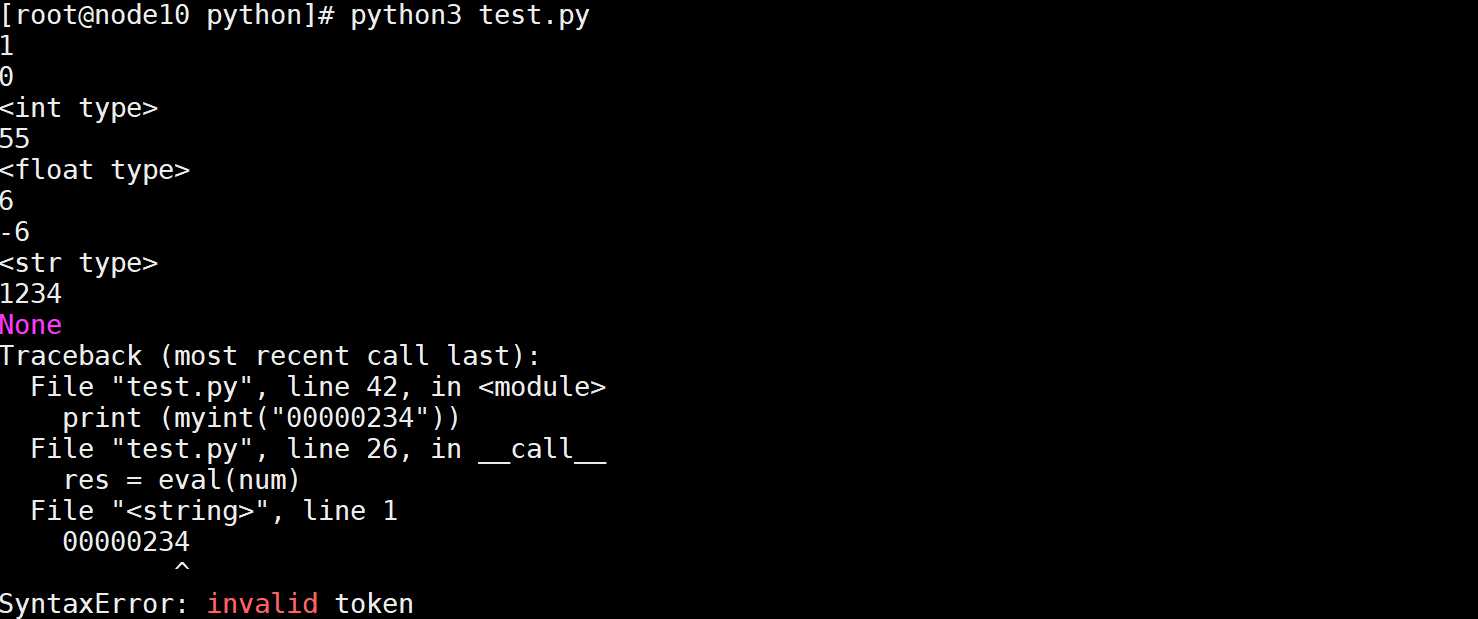标签:字符串类 情况下 python idt 析构 odi 内存 rip sde
class Plane(): def __init__(self,name): self.name = name def fly(self): print ("我的飞机是{}飞的很快".format(self.name)) def __del__(self): print ("析构被触发") obj = Plane("高超音速") obj.fly()
执行
[root@node10 python]# python3 test.py 我的飞机是高超音速飞的很快 析构被触发
删除对象
class Plane(): def __init__(self,name): self.name = name def fly(self): print ("我的飞机是{}飞的很快".format(self.name)) def __del__(self): print ("析构被触发") obj = Plane("高超音速") print ("<=======================start del=========================>") del obj print ("<=======================end del=========================>")
执行
[root@node10 python]# python3 test.py <=======================start del=========================> 析构被触发 <=======================end del=========================>
当只删除一个对象,还有剩余对象,也不会触发
class Plane(): def __init__(self,name): self.name = name def fly(self): print ("我的飞机是{}飞的很快".format(self.name)) def __del__(self): print ("析构被触发") obj = Plane("高超音速") obj2 = obj print ("<=======================start del=========================>") del obj print ("<=======================end del=========================>")
执行,是在页面执行完毕是触发
[root@node10 python]# python3 test.py <=======================start del=========================> <=======================end del=========================> 析构被触发
class Plane(): def __init__(self,name): self.name = name def fly(self): print ("我的飞机是{}飞的很快".format(self.name)) def __del__(self): print ("析构被触发") obj = Plane("高超音速") obj2 = obj print ("<=======================start del=========================>") del obj del obj2 print ("<=======================end del=========================>")
执行
[root@node10 python]# python3 test.py <=======================start del=========================> 析构被触发 <=======================end del=========================>
fp = open("ceshi.txt","r",encoding="utf-8") res = fp.read() print (res)
执行
[root@node10 python]# cat ceshi.txt 君临天下 [root@node10 python]# python3 test.py 君临天下
有这个文件,就创建一个对象
fp = open("ceshi.txt","r",encoding="utf-8") res = fp.read() fp.close() print (res) import os class ReadFile(): def __new__(cls,name): if os.path.exists(name): return object.__new__(cls) return print("没有这个文件") obj=ReadFile("ceshi.txt") print (obj)
执行
[root@node10 python]# python3 test.py 君临天下 <__main__.ReadFile object at 0x7f5c2271b518>
如果不存在
fp = open("ceshi.txt","r",encoding="utf-8") res = fp.read() fp.close() print (res) import os class ReadFile(): def __new__(cls,name): if os.path.exists(name): return object.__new__(cls) return print("没有这个文件") obj=ReadFile("ceshii11.txt") print (obj)
执行
[root@node10 python]# python3 test.py 君临天下 没有这个文件 None
import os class ReadFile(): def __new__(cls,name): if os.path.exists(name): return object.__new__(cls) return print("没有这个文件") def __init__(self,name): self.fp = open("ceshi.txt","r",encoding="utf-8") def readcontent(self): res = self.fp.read() return (res) def __del__(self): self.fp.close() obj=ReadFile("ceshi.txt") print (obj) res = obj.readcontent() print (res)
执行
[root@node10 python]# python3 test.py <__main__.ReadFile object at 0x7f601b50e470> 君临天下
如果文件不存在
import os class ReadFile():
#创建对象 def __new__(cls,name): if os.path.exists(name): return object.__new__(cls) return print("没有这个文件") def __init__(self,name):
#把文件对象赋值给该对象的fp成员属性 self.fp = open("ceshi.txt","r",encoding="utf-8")
#读取文件内容 def readcontent(self): res = self.fp.read() return (res)
#关闭文件 def __del__(self): self.fp.close() obj=ReadFile("ceshi111.txt") print (obj) res = obj.readcontent() print (res)
执行

把对象当成函数进行调用,自动触发__call__
class MyClass(): def __call__(self): print ("call方法被调用") obj = MyClass() obj()
执行
[root@node10 python]# python3 test.py call方法被调用
如果没有__call__调用就会出错
class MyClass():
# def __call__(self): # print ("call方法被调用") pass obj = MyClass() obj()
执行报错

class Shopping(): def __init__(self,who): self.who = who def step1(self): print ("{}出门".format(self.who)) def step2(self): print ("{}开车去商场".format(self.who)) def step3(self): print ("{}买完东西回家".format(self.who)) obj = Shopping("女朋友") obj.step1() obj.step2() obj.step3()
执行
[root@node10 python]# python3 test.py 女朋友出门 女朋友开车去商场 女朋友买完东西回家
class Shopping(): def __init__(self,who): self.who = who def __call__(self): self.step1() self.step2() self.step3() def step1(self): print ("{}出门".format(self.who)) def step2(self): print ("{}开车去商场".format(self.who)) def step3(self): print ("{}买完东西回家".format(self.who)) obj = Shopping("女朋友") obj()
执行
[root@node10 python]# python3 test.py 女朋友出门 女朋友开车去商场 女朋友买完东西回家
class Shopping(): def __init__(self,who): self.who = who def __call__(self,shop): self.shop = shop print ("我的{}要去{}".format(self.who,self.shop)) self.step1() self.step2() self.step3() def step1(self): print ("{}出门".format(self.who)) def step2(self): print ("{}开车去商场".format(self.who)) def step3(self): print ("{}买完东西回家".format(self.who)) obj = Shopping("女朋友") obj("购物")
执行
[root@node10 python]# python3 test.py 我的女朋友要去购物 女朋友出门 女朋友开车去商场 女朋友买完东西回家
class Shopping(): def __call__(self,who): self.who = who print ("我的{}要去购物".format(self.who)) self.step1() self.step2() self.step3() def step1(self): print ("{}出门".format(self.who)) def step2(self): print ("{}开车去商场".format(self.who)) def step3(self): print ("{}买完东西回家".format(self.who)) obj = Shopping() obj("女朋友")
执行
[root@node10 python]# python3 test.py 我的女朋友要去购物 女朋友出门 女朋友开车去商场 女朋友买完东西回家
class Shopping(): def __call__(self,who,shop): self.who = who self.shop = shop print ("我的{}要去{}".format(self.who,self.shop)) self.step1() self.step2() self.step3() def step1(self): print ("{}出门".format(self.who)) def step2(self): print ("{}开车去商场".format(self.who)) def step3(self): print ("{}买完东西回家".format(self.who)) obj = Shopping() obj("女朋友","购物")
执行
[root@node10 python]# python3 test.py 我的女朋友要去购物 女朋友出门 女朋友开车去商场 女朋友买完东西回家
import math class MyInt(): def __call__(self,num): if isinstance(num,bool): if num == True: return 1 else: return 0 elif isinstance(num,int): return num elif isinstance(num,float): if num < 0: return math.ceil(num) else: return math.floor(num) myint = MyInt() print (myint(True)) print (myint(False)) print ("<int type>") print (myint(55)) print ("<float type>") print (myint(6.9)) print (myint(-6.9))
执行
[root@node10 python]# python3 test.py 1 0 <int type> 55 <float type> 6 -6
判断字符串类型
import math class MyInt(): # sign 代表符号,默认正值 def myfunc(self,strvar,sign = 1): isnull = strvar.lstrip("0") # 判断是否处理完的字符串是不是空的,如果是空的,这个串是"0000.."是因为eval("")会出现错误 if isnull == "": return 0 res = eval(strvar) * sign return res def __call__(self,num): if isinstance(num,bool): if num == True: return 1 else: return 0 elif isinstance(num,int): return num elif isinstance(num,float): if num < 0: return math.ceil(num) else: return math.floor(num) elif isinstance(num,str): if (num[0] == "+" or num[0] == "-") and num[1:].isdecimal(): if num[0] == "+": sign = 1 else: sign = -1 return self.myfunc(num[1:],sign) elif num.isdecimal(): return self.myfunc(num) else: return "对不起,处理不了这个数据类型" myint = MyInt() print (myint(True)) print (myint(False)) print ("<int type>") print (myint(55)) print ("<float type>") print (myint(6.9)) print (myint(-6.9)) print ("<str type>") print(myint("11122233"),type(myint("11122233"))) # print(myint("00001223")) print(myint("-11122233"),type(myint("-11122233")))
print(myint([1,2,3,4]))
执行
[root@node10 python]# python3 test.py 1 0 <int type> 55 <float type> 6 -6 <str type> 11122233 <class ‘int‘> -11122233 <class ‘int‘>
对不起,处理不了这个数据类型
使用eval可以转化为数字,但是在特殊情况下并不能执行
但是空值,带-号的会
[root@node10 python]# cat test.py import math class MyInt(): # sign 代表符号,默认正值 def myfunc(self,strvar,sign = 1): isnull = strvar.lstrip("0") # 判断是否处理完的字符串是不是空的,如果是空的,这个串是"0000.." if isnull == "": return 0 res = eval(strvar) * sign return res def __call__(self,num): if isinstance(num,bool): if num == True: return 1 else: return 0 elif isinstance(num,int): return num elif isinstance(num,float): if num < 0: return math.ceil(num) else: return math.floor(num) elif isinstance(num,str): if num.isdecimal():
#或者使用self.myfunc(num)
res = eval(num) return res else: return "对不起,处理不了这个数据类型" myint = MyInt() print (myint(True)) print (myint(False)) print ("<int type>") print (myint(55)) print ("<float type>") print (myint(6.9)) print (myint(-6.9)) print ("<str type>") print (myint("1234")) print (myint("-234")) print (myint("00000234"))
执行

普通方式
class Show(): def showtime(func): def newfunc(): print ("准备演出") func() print ("退出演出") return newfunc @Show.showtime def func(): print ("张靓颖正在鸟巢演出") func()
执行
[root@node10 python]# python3 test.py 准备演出 张靓颖正在鸟巢演出 退出演出
使用__call__
[root@node10 python]# cat test.py class Show(): def __call__(self,func): return self.showtime(func) def showtime(self,func): def newfunc(): print ("准备演出") func() print ("退出演出") return newfunc @Show() #@obj =>func = obj(func) => 返回的新函数替换旧函数 def func(): print ("张靓颖正在鸟巢演出") func()
执行
[root@node10 python]# python3 test.py 准备演出 张靓颖正在鸟巢演出 退出演出
@有两个作用
(1)自动把装饰器下面的函数当成参数进行传递
(2)把返回的新函数,自动赋值,用来替换旧函数
执行过程
Show()返回一个obj对象
@obj发动技能,把参数传递给obj
obj(func)返回newfunc
@发动技能,把新函数替换旧函数
func = newfunc,则func()就等价于newfunc()
033.Python的__del__析构方法he__call__方法
标签:字符串类 情况下 python idt 析构 odi 内存 rip sde
原文地址:https://www.cnblogs.com/zyxnhr/p/12345066.html